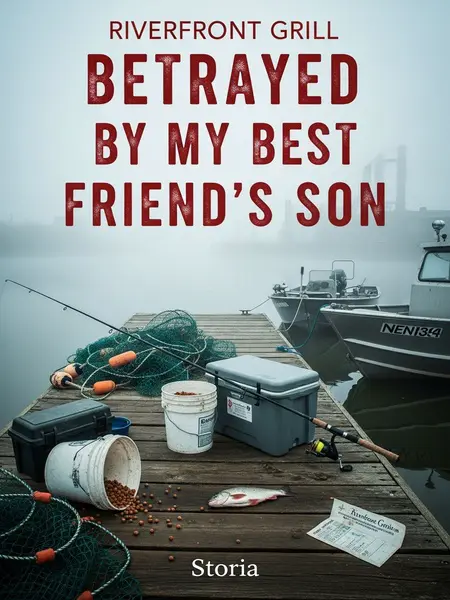Chapter 4: A Scandal Served Cold
I glanced again at the restaurant’s photo wall and understood.
It was like a silent message—the old order was gone, replaced by something colder, more transactional. The new photo looked glossy and expensive, but to me, it was just a reminder of what we’d lost.
This must be Tom Caldwell’s idea—using Rick’s price to pressure me.
I felt a bitter taste in my mouth. Maybe Tom thought he could strong-arm me into dropping my prices, trading two decades of partnership for a few bucks a pound.
Over the years, his restaurant grew and became my biggest client.
He’d come a long way from that first shack, with lines out the door and write-ups in Southern Living. I knew I’d played a part in his rise, and maybe he’d started to take that for granted.
His pan-seared striped bass was famous, attracting diners from all over.
Tourists would show up, GPS in hand, just to try the dish. Foodies from Atlanta and Charleston raved about it online, and reservations were booked out weeks in advance.
Because of this dish, many food bloggers visited, and Tom Caldwell’s reputation soared.
He’d been on the local morning show more than once, grinning next to some TV chef. The press loved him, and he loved the attention.
That’s how people get carried away.
Pride comes before the fall. I’d seen it before in this town—the higher they climbed, the harder they crashed.
In the past, when I delivered fish, Tom Caldwell would greet me in person and chat for a while.
He’d come out the back door, flour dusted on his arms, and we’d talk about the Braves, or the latest boat repairs. He always found time for a quick story or a good laugh.
But lately, I hadn’t seen him at all.
The last few deliveries, it was all business. Marcus would sign the slip, hand over the check, and send me on my way. Tom was a ghost, holed up in his office or out front playing celebrity chef.
Even in interviews, he’d boast:
“My great-grandfather was a chef for the governor. To be honest, cooking doesn’t really depend on ingredients.”
“Even if you give me a carrot, I can make it taste like lobster.”
I’d heard him say it on TV, and it made my skin crawl every time. Maybe it played well to the cameras, but I knew better. A carrot ain’t a lobster, no matter how you slice it.
Thinking of this, I didn’t want to say another word. I told my workers to load the fish buckets back onto the pickup.
I couldn’t take it anymore. My guys moved fast, not saying a word, just following my lead. There was a kind of silent understanding among us—this wasn’t just about fish; it was about dignity.
Even if the fish rot, I won’t sell them to him.
Let the whole batch go to waste before I’d let him cheat me out of my hard work. Sometimes, standing your ground was worth more than a paycheck.
Let’s see if he can make his signature dish with dead fish.
I hoped he’d learn the hard way—some lessons you have to pay for yourself.
I closed the truck door and drove off.
The engine roared to life, and I pulled out onto the street, the sun glaring off the hood. My hands were still shaking on the steering wheel, a mix of anger and regret swirling in my chest.
Tyler spat a thick wad of phlegm at my bumper in contempt.
I watched in the rearview mirror as it hit the pavement, a final punctuation mark to a rotten morning. If he thought that would get under my skin, he didn’t know me as well as he thought.
As I turned, I saw in the rearview mirror Rick hauling a big basket full of dead fish.
There he was, swaggering across the lot, the basket slung over his shoulder, a sly grin on his face. Business was business, but I knew Rick’s reputation—he’d sell anything to anyone if the price was right.
Tyler nodded and waved him in.
No hesitation—just a quick wave, the kind you give a delivery guy, not a partner. It was clear now: the decision had been made long before I showed up.
I’d barely left, and Rick was already delivering fish. Clearly, Tom Caldwell had long planned to cut me out.
It stung, but it also clarified things. There’s no coming back from a move like that. In this business, loyalty has a shelf life, just like fish.
Striped bass at six a pound is cheap, but in the restaurant business, reputation is everything.
You can cut costs all you want, but if your food turns sour, so does your name. Folks around here don’t forget when you cheat them on a meal.
Tom Caldwell is really slipping as he gets older.
Maybe he thought he was untouchable, or maybe he just stopped caring. Either way, the writing was on the wall.
When I got back to the fish farm, all the striped bass in the buckets were dead.
The air back home was thick with pondwater and the endless chorus of tree frogs. I popped the tailgate and stared at the still bodies, feeling like I’d lost a part of myself. The workers milled around, not sure what to say. The silence was heavy, broken only by the low hum of the aerators in the nearby ponds.
A hundred or so striped bass, worth thousands, gone just like that.
I ran the numbers in my head—thousands of dollars, hours of labor, all wasted. I felt my shoulders sag, the weight of the day finally settling in.
The workers were about to process them as dead fish, dumping them into the grinder to make fish feed.
They rolled the barrels toward the shed, prepping the grinder. It felt like adding insult to injury—turning prime fish into nothing but chum.
But I stopped them: “These fish are still useful. I’ll make them eat back what they spat out.”
I had them fish out the bass and move them into cold storage.
We set up extra freezer space, stacking the fish with care. There was a lesson here somewhere, but I was too tired to look for it just then.
After finishing, I leaned back in my old desk chair, staring at the water stains on the ceiling, letting the silence swallow me.
My fish farm’s output keeps growing. Even without today’s incident, it’s time to expand my sales channels.
I pulled out a legal pad and started scribbling down ideas—routes, contacts, maybe a new distributor in Atlanta. It was time to bet on myself again, just like I did when I first started out.
Over the years, I’d used my earnings to buy several refrigerated trucks and acquired a canning plant.
I’d made smart moves, built up the business piece by piece. Now, those investments would finally pay off. I just needed to take the next step.
That way, I’d never have to worry about long-distance orders again.
I could ship anywhere in the Southeast, even out to Dallas or Chicago if the price was right. The future was wide open—if I had the guts to chase it.
Several inland restaurants had wanted me to supply them, but transportation was always an issue.
Chefs from Nashville and Birmingham had called, begging for a taste of my bass, but I’d always worried about spoilage on the road. Now, with the right trucks and cold storage, I could finally say yes.
Taking this opportunity, I invited them to Savannah for a tour of my fish farm and to sign supply contracts.
I fired off a few emails, made some calls. Within a week, the farm was buzzing with visitors—chefs in designer sneakers, restaurant owners with thick portfolios, all eager for a taste of something new.
The owners all praised the fat striped bass in my ponds.
They snapped photos, took notes, asked a hundred questions. I felt a spark of pride watching them marvel at my operation, the result of years of sweat and stubbornness.
At lunch, someone suggested going to Riverfront Grill to try the famous pan-seared striped bass.
One of the Atlanta guys grinned and said, “If we’re in Savannah, we gotta eat like locals.” I hesitated, but pride made me nod. Let’s see what they’re serving now.
I went with them.
We piled into cars, laughing and talking, the tension of the morning all but forgotten. The air was thick with summer, the live oaks draped in Spanish moss as we wound our way downtown.
But after sitting down, I noticed the place was less than half full. Most private rooms were empty.
It was eerie—the once-bustling dining room felt hollow, echoes bouncing off empty tables. I remembered the days when you couldn’t get a seat without calling three weeks ahead.
Back in the day, it was impossible to get a seat. The servers were always polite but proud to turn away reservations.
They used to have a waiting list taped to the door, names scrawled in every margin. Now, the hostess barely looked up from her phone as we walked in.
I called a server over: “One pan-seared striped bass, please.”
Though I no longer worked with Tom Caldwell, I wanted to see how he made his signature dish now—could he really make it taste like lobster?
The waitress looked embarrassed. “Honestly, sir, the fried bass bites are our most popular today. They’re real fresh, promise.”
She wouldn’t meet my eye, fidgeting with her notepad. I caught a whiff of something burnt coming from the kitchen, the air heavy with fryer smoke. The walls, once lined with Polaroids of grinning customers, now sported generic art prints and a neon IPA sign. A few plastic cups of iced sweet tea sweated on a crate by the back door, and a faded Braves bumper sticker clung to the kitchen exit—remnants of the South still clinging on.
Who’d have thought Riverfront Grill would resort to discounts to attract customers?
It was a sure sign things were going downhill. This place used to sell out every plate, and now they were offering two-for-ones on the specials board.
Anyone in the restaurant business knows: when the meat isn’t fresh, spicy and oily flavors are the best way to cover it up.
We all shared a look—one of those unspoken chef things. If you’ve got to drown your fish in sauce, you’re hiding something.
I waved my hand. “We came for your signature dish. Price is no issue.”
The other owners nodded, saying they’d come because of its reputation.
They murmured in agreement, eager for a taste of the dish they’d heard so much about. I saw the hope in their eyes, the same curiosity I’d once felt bringing Tom my first big catch.
The waitress had no choice but to take the order.
She scribbled it down, glancing nervously over her shoulder as she hurried back to the kitchen. The air in the dining room felt even heavier now, as if the whole building was holding its breath.
Soon, a steaming plate of pan-seared striped bass arrived.
The aroma was off—an odd blend of old oil and stale fish. The presentation, once Tom’s pride, looked half-hearted, the sauce clinging to the plate in greasy puddles.
Everyone at the table was a leader in the restaurant business, many of them chefs.
I could feel their eyes narrowing, forks hovering above the plate. In this crowd, a bad dish wouldn’t stay secret for long.
At a glance, we could tell—the fish’s eyes were sunken, its flesh was grayish-white, and some spots were missing skin.
I poked at the fillet with my fork, the flesh breaking apart with barely any resistance. Someone whispered, “That’s not fresh.” Around the table, jaws clenched and heads shook. No one wanted to be the first to taste it.
Everyone knew at once: this was made with dead fish. No one wanted to pick up their fork.
A silence settled over the table, thick as a southern thunderstorm. The kind of quiet that says everything words can’t.
At that moment, a shout came from the next table.
A man in a plaid shirt flipped the table.
“Get your boss out here!”
“I came over a thousand miles from the Midwest to check out your restaurant, and you serve me rotten fish?”
“Today, you’d better give me and all my followers an explanation!”
His voice boomed across the dining room, phone in hand, already livestreaming the meltdown to his social media followers. Within seconds, every head in the place had turned, the restaurant’s shame broadcast to the world—just like that. In the restaurant business, it only takes one bad meal to undo a thousand good ones. Phones came out, cameras rolled, and by the time Tom Caldwell staggered out of the kitchen, his empire was already crumbling—live, for everyone to see.













